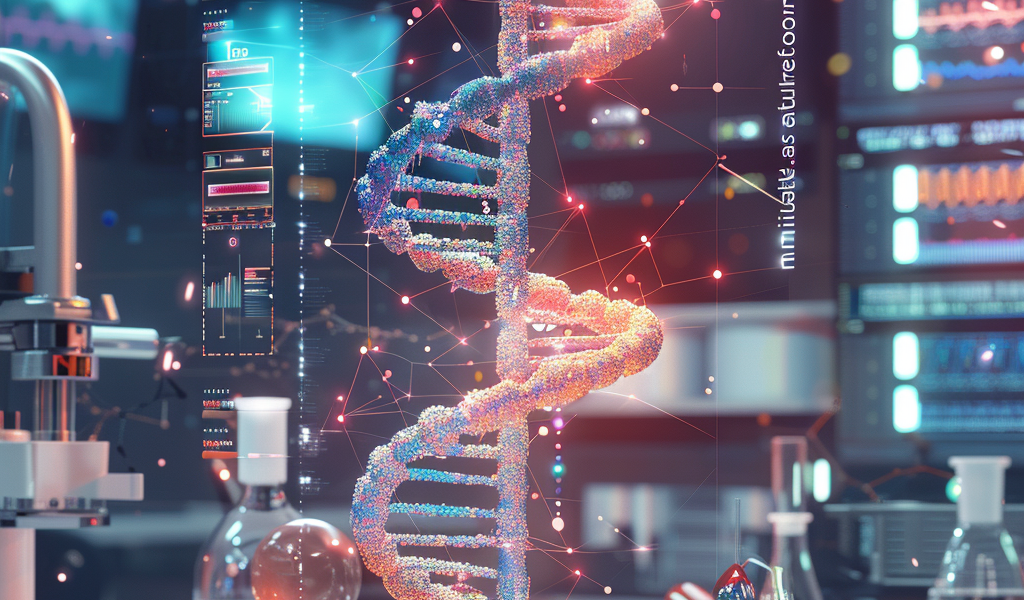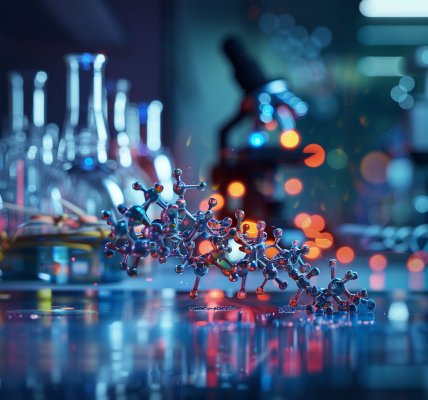AI and Genetic Engineering: Pioneering the Future of Bespoke Proteins for Environmental Solutions
Recent advancements in artificial intelligence (AI) and genetic engineering are paving the way for the development of bespoke proteins, which could play a significant role in addressing some of the most pressing environmental challenges we face today. According to Professor Marc Zimmer from Connecticut College, these innovations have the potential to transform biotechnology and offer solutions to climate change.
In her Nobel Prize lecture in chemistry in 2018, Frances Arnold remarked on the capabilities of modern science, stating, “Today we can for all practical purposes read, write and edit any sequence of DNA, but we cannot compose it.” However, this statement has evolved with the rapid progress in the field. AI has now advanced to a point where it can not only read and edit DNA but can also compose new sequences, working in tandem with genetically modified bacteria to create tailored proteins.
The objective behind these developments is to harness the design capabilities of AI alongside the engineering prowess of gene editing. By modifying bacteria to function as miniature factories, scientists can produce innovative proteins that may help to mitigate greenhouse gas emissions, break down plastics, or serve as targeted pesticides that do not harm non-target species.
Understanding the fundamentals of proteins is crucial, as they are integral to various biological processes. Proteins are composed of amino acids, the sequence of which is dictated by the genetic code contained in DNA and RNA. In humans, proteins account for approximately 75% of dry weight and are essential components of muscles, enzymes, hormones, blood, hair, and cartilage. Thus, a deep understanding of proteins can unlock many biological mysteries.
The journey towards understanding proteins began with the Human Genome Project, an ambitious international endeavor that aimed to sequence the entire human genome between 1990 and 2003. This project successfully mapped the complete sequence of 3 billion nucleotide base pairs, which code for approximately 20,000 to 25,000 genes. However, even after this monumental achievement, deciphering the functions of most proteins and correcting their malfunctions remains a significant challenge in molecular biology.
One critical aspect of protein functionality is its three-dimensional shape, which is determined by the amino acid sequence. Misfolded proteins can lead to various diseases, including neurodegenerative disorders, cystic fibrosis, and Type 2 diabetes. Therefore, understanding the folding process and the resulting shape of proteins is essential for developing effective treatments.
Traditionally, the only method available for determining protein structures was X-ray crystallography, a complex laboratory technique that relies on the diffraction of X-rays through crystalline samples. However, this method is time-consuming and requires substantial resources. In recent years, AI has emerged as a powerful tool in predicting protein structures, significantly accelerating the process and making it more accessible.
One of the most notable breakthroughs in this area came from DeepMind, a subsidiary of Alphabet Inc., which developed an AI program known as AlphaFold. This program demonstrated remarkable proficiency in predicting protein structures with high accuracy, marking a turning point in structural biology. By utilizing machine learning algorithms and vast datasets of known protein structures, AlphaFold can now predict the shape of a protein based solely on its amino acid sequence.
With AI’s ability to predict protein structures and gene editing technologies like CRISPR, researchers can now design and produce bespoke proteins tailored for specific applications. This capability opens up a myriad of possibilities in biotechnology, from creating enzymes that can efficiently break down plastic waste to engineering proteins that can sequester carbon dioxide from the atmosphere.
The implications of these advancements extend beyond environmental applications. In agriculture, bespoke proteins could lead to the development of more effective and environmentally friendly pesticides that target specific pests without harming beneficial organisms. Similarly, in medicine, custom-designed proteins could be used for targeted therapies, providing more precise treatments for various diseases.
Despite the enormous potential of AI and gene editing in creating bespoke proteins, ethical considerations must also be addressed. As with any powerful technology, the implications of modifying living organisms and creating new biological entities raise questions about safety, environmental impact, and the potential for misuse. Therefore, ongoing discussions about the regulations and ethical frameworks surrounding these technologies are essential.
As we move forward, the collaboration between AI and genetic engineering holds great promise for creating innovative solutions to some of the world’s most significant challenges. The potential for bespoke proteins to address climate change, enhance food security, and improve human health is vast, and continued research in this field is crucial for unlocking these possibilities.
In summary, the intersection of artificial intelligence and genetic engineering marks a new era in biotechnology. As scientists and researchers harness these tools, the future may hold unprecedented opportunities for developing bespoke proteins that can transform industries and contribute to a more sustainable world.





